Chengdu 2023: A Bittersweet Symphony of a Worldcon

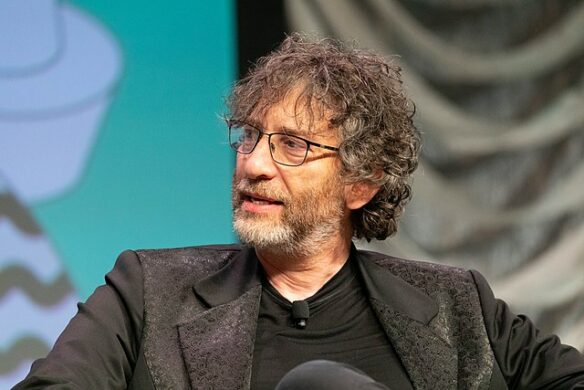

I’ll take you down the only road I’ve ever been down
Been down
Ever been down
Ever been down
Ever been down
Ever been down
Have you ever been down?
Have you ever been down?
Have you ever been down?
++ “Bittersweet Symphony” by Richard Ashcroft of The Verve, with Mick Jagger and Keith Richards
By Chris M. Barkley: January 20th, 2024: A Day that will live in Fannish Infamy.
What was that day like? It was like racing down the stairs on Christmas Day and spotting a large package containing the LARGEST chocolate bar you have ever seen, ripping the wrapping and packaging unheeded and sinking your teeth into it for a BIG bite…only to find out an instant later and much to your horror, that your dear, elderly, nearsighted grandparents had bought a gigantic bar of bitter, very untasty, dark baking chocolate.
Yes, THAT kind of day. And every single day since then…
My partner Juli and I were taking a midmorning break after a panel and a late breakfast in our hotel room last Saturday at the 49th edition of the ConFusion sf convention in Novi, Michigan, when she noticed a Facebook post from a well known Chicago area sf fan, Dave McCarty:
· January 20 at 11:48 am
“For those following at home, the release is out.”
As many of you may now know, Mr. McCarty was one of the lead Hugo Award Administrators for the 81st World Science Fiction convention that took place in the People’s Republic of China’s fourth largest city, Chengdu. It also happens to be the capital of China’s sff community.
We, along with a lot of people in the fannish community, had been eagerly awaiting the release of the 2023 Hugo Awards Long List of Nominations.
You may also be aware that I attended the convention, too; not only in the capacity of File 770’s foreign correspondent, but as a Hugo Award Finalist in the Best Fan Writer Category.
During my stay I did not encounter any problems with anyone on the Convention Committee, congoing staff or fans, or any of the police or security services who were (heavily) present. I, in turn, was very polite and circumspect in my behavior and attitude while I was there, since I considered myself as a diplomat for my country AND for the international fannish community as well.
Full Disclosure: I was an invited guest of the Chengdu World Science Fiction Committee and the host fan group, the Chengdu Science Fiction Society. I did so of my own free will, knowing that the People’s Republic of China is a totalitarian regime with a very vigorous system of surveillance and social intimidation. I went to Chengdu, with airfare and expenses paid, without any prior restraints on what I could say, do or go. I went because:
(a) I was invited by the hosts of the convention and I wanted to represent the sf community on a world stage.
(b) I was a Hugo Award nominee for fan writing and, most importantly —
(c) I am 67 freaking years old and exactly WHEN THE HELL was I going to get another chance to visit Asia, much less the People’s Republic of China?
So, I went all in, with my eyes, and ears wide open. I was on the lookout for anything unusual. I even took a “dumb phone” which had a very limited connectivity and functions just in case the Chinese security services became a little too interested in me. (This rather foolish and overly paranoiac move actually caused more problems than it actually solved.
(Note: I am currently at work transcribing a diary I kept during the period of my nomination and my stay at the convention where this blunder and other fascinating things will be revealed. It will be published on File770 later this year.)
Onward…
[Chris Barkley’s column continues after the jump.]
Until very recently, the Hugo Award voting statistics were made public immediately after the Ceremony itself. In 2022, while I was the head of the Press Relations team at Chicon 8, I received word that from Seanan Maguire that the release of the final vote and long list was a problem for her, other nominees and Hugo Award recipients because fans would approach in person (or online) with inane comments like “I voted for you” and “You were robbed” and, most damningly, “You lost by so-many votes”.
Having witnessed such callous and insensitive activity at previous Worldcons, I sent a message to the Hugo Award administrators on site outlining the problem and pleaded with them to put a 24-48 hour hold on disseminating that data for the sake of everyone involved. Thankfully, they complied.
In the frenzied aftermath of the Chengdu Hugo Awards Ceremony I was rather hoping that the trend of holding back the voting statistics would continue. Little did I know at the time that’s exactly what was going to happen.
In spades.
So, at the time, I was very relieved when the statistics were not released right away. But for several weeks afterwards, I, and a great many other fans both here and abroad, began to wonder when that was going to happen.
On December 2nd Hugo Award Administrator Dave McCarty, who was attending an annual convention runner’s meeting in Providence, Rhode Island, posted the following on his Facebook page:
My “next” public announcement (revising a statement I just made an hour ago on a panel about the Chengdu Worldcon that was held this morning):
The Hugo voting stats have been on a long and winding journey, but that journey is at an end. They have been reviewed at multiple levels by our team and all the things we could find that needed correction have been resolved.
The usual bugaboos like typos in the summation formulas have been joined with items like “this is a valid translation of that phrase, but it’s not the right one for this purpose” (which happened a bunch of places) and “this font is meant for Japan and while readable, won’t look appropriate to fans in China” (which was a hard one to get rid of because I kept misunderstanding the feedback).
But, we think they’re as correct as we can make them.
The reviews finished too late “today” in China. The website folks are already asleep.
They should have the results up on the website by noon “tomorrow” (a bit more than 12 hours from now) and at that point there should be social media announcements and I will push the PDF to TheHugoAwards.org and a few other places like Locus and file770.
The last page of the PDF says roughly what I’m about to say here:
The nomination stats are not out yet. We will definitely have them out before the deadline of 90 days post convention, but right now “No, I don’t have an expected release date”
Again, folks connected with me are free to spread this post wherever they think appropriate.
And the very next day, they were: https://www.thehugoawards.org/wp-content/uploads/2023/12/2023-Hugo-Awards-Stats.pdf
Of particular interest to me were the results of the Best Fan Writer race:
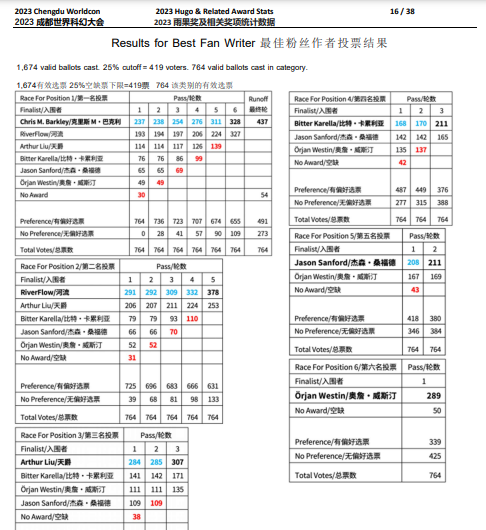
I admit that I am not an expert of ranked choice voting, but it sure looked to me as though I led throughout all six rounds of voting. And in that last column, number six…there’s a separation of one vote.
It was my partner, Juli, who knows many more things about ranked choice voting than I do, gently informed me that I had won BY JUST ONE VOTE!
Well, that little factoid shook me to my core! Had I found this out while I was still in China I guarantee you that I would have freaked out on the spot!
Shortly thereafter that day, I received many messages through social media congratulating me on winning what was being called THE closest race in the history of the Hugo Awards. BUT, that wasn’t QUITE as true as I thought it might be…
Just out of curiosity, I did a little research on this and I have found only one other instance of a one-vote victory taking place during the modern, ranked voting era of the Hugo Awards (since 1998). Which, interestingly enough, was also in the Best Fan Writer Category in 2007:
First place
Dave Langford: 80/80/88/103/128
John Scalzi: 87/88/92/102/127
John Hertz: 60/60/72/80
Steven H Silver: 37/37/42
Chris Garcia: 32/32
No Award: 25
End of digression, onward.
After looking through all of the other categories, I found a curious announcement on the very last page (in English and in Mandarin):
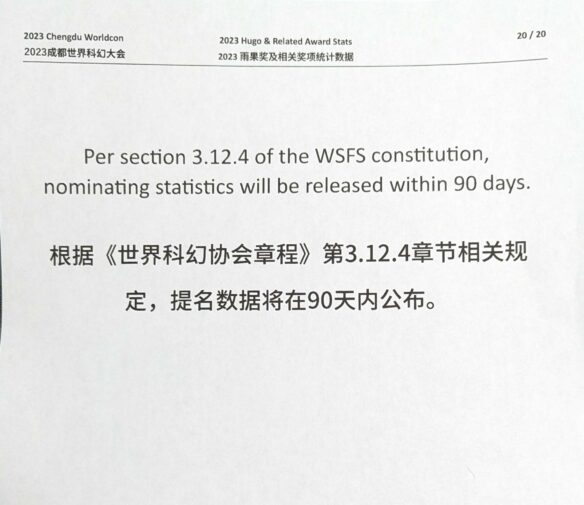
My thought at the time was that this was a very peculiar thing to post; why would there be a delay? If the final tally had already been completed, what was the holdup in releasing the Long List of nominations?
As December lapped into January, it became apparent to me (and everyone else) that the release was being deliberately held back until the last possible day, Friday, January 19th.
Later that same morning, Juli and I traveled north to attend ConFusion, one of Michigan’s oldest annual sf conventions. I was their Fan Guest of Honor last year and this year it was my honor to introduce this year’s Fan Guest, the renowned fan writer and cartoonist Kurt Erichsen.
By the end of the day here in the US Eastern Time Zone, there was no announcement of voting results.
Shortly before noon, the Long List went up. But Mr. McCarty failed to mention where it was available, so I shot him a quick dm asking where? He quickly replied it was on the Hugo Awards website.
The site had a repeat of the Final Ballot results, followed by the Long List.
And THAT, dear readers, is where the anti-matter really hit the shitfan…
On the very first page, I was gobsmacked by the exclusion of R.L. Kuang’s Nebula And Locus Magazine award winning novel, Babel!
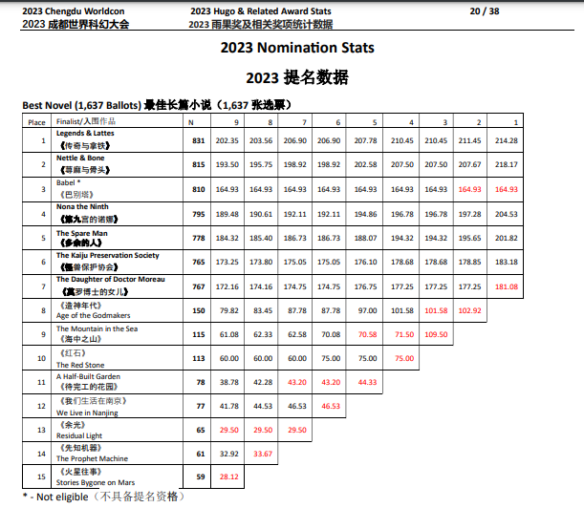
My shock quickly continued when I noted the ineligible status of the novelette “Color The World” by Congyun “Mu Ming” Gu and the short story “Fongong Temple Pagoda” by Hai Ya without any explanation. It was subsequently revealed that Gu’s story was first published in 2019. Ya’s exclusion remains unexplained.
Besides Babel’s egregious banishment, the other big ‘ineligibles” were:
- The absence of the Neil Gaiman produced series The Sandman and Episode Six, “The Sound of Her Wings”
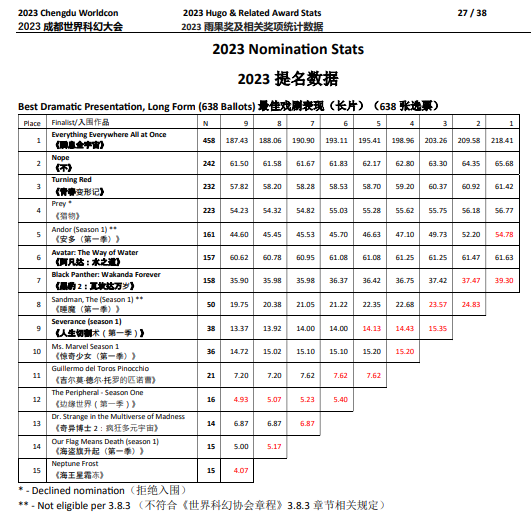
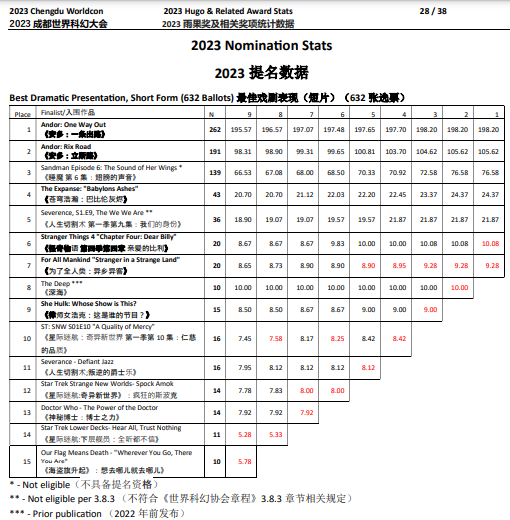
- Paul Weimer being excised from the Best Fan Writer category
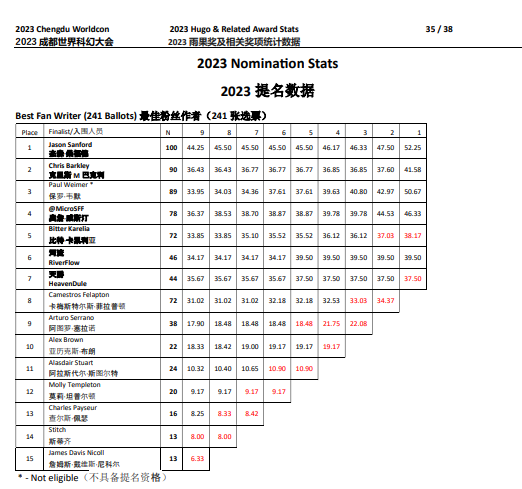
- Xiran Jay Zhao being declared “not eligible” on the Astounding Award Final Ballot
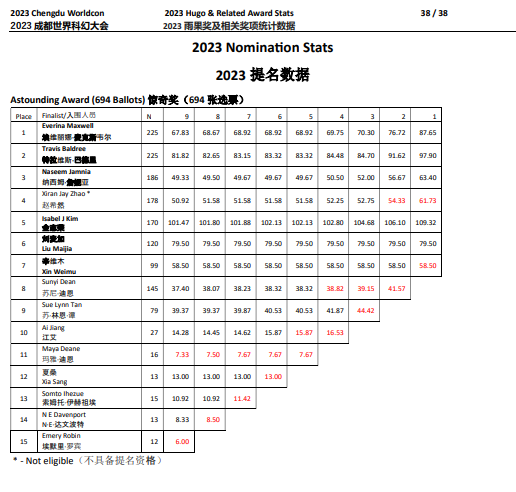
All of this almost made me physically ill.
Meanwhile, news of the Long List controversy spread like an out of control wildfire among the ConFusion attendees. As I went to panels and wandered the hotel, several people went out of their way to come up and to assure me that my winning this year was worthy and well deserved.
While I found these kind gestures reassuring, the feelings of guilt and helplessness haunted me on the long drive home Sunday evening.
Following the announcement, I have been beset with daily bouts of insomnia, emotional mood swings, restlessness, acid reflux and random headaches.
Almost immediately, there was widespread condemnation of the Chengdu Convention Committee and the Hugo Award Administrators who oversaw the voting. Fans, writers, artists and editors, here and all over the rest of the world (including in the PRC as well) have universally hailed that the release was not only damaging to the nominees and winners, it had cast severe doubts on the reputation AND the future of the Hugo Awards.
As one of the winners of this year’s awards, I felt I had a personal responsibility to spread the news of the growing debacle and to openly comment where I could online against what seemed to be an attempt to stifle the expression of opinions and free speech.
As I posted my outrage on social media, it was pointed out to me by several people that what may have happened may not have been a direct attempt to censor by the Chinese Communist Party, but a move to “self censor” by entities either inside or adjacent to the convention to avoid any direct measures from the government. I was also pointed in the direction of this vital essay by sf author and educator, Ada Palmer, “Tools For Thinking About Censorship”.
If Ms. Palmer’s assertions were put to the test in this particular case, it might explain the evasive answers given by Hugo Administrator Dave McCarty and the pointed lack of response from the Chengdu convention runners. But, with no witnesses coming forward or any other concrete evidence of malfeasance other than the cold equations of the Long List, everyone was speculating about what really happened.
I note that I saw some ominous comments online in the past few days; that “throwing someone under the bus may have a FAR different and more serious meaning in other countries, especially authoritarian ones, than it would be here in the United States or in other democracies.”
When it comes to matters involving freedom of expression or, as we usually refer to “free speech”, we Americans (in particular) take an almost offensively chauvinistic pride of our First Amendment rights granted through our US Constitution as a fundamental part of our open society. People who live in less democratic circumstances, like Russia, North Korea, Turkey or, in this case, the People’s Republic of China, tend to be very reticent about telling others exactly what’s on their mind.
I heard an appropriate Chinese aphorism at a dinner one evening while I was in Chengdu; “We say little. But we see all.”
So it was quite telling when a BlueSky user named Angie Wang posted some very virulent criticisms of the Chengdu conrunners by La Zi a Vice-Chair of the convention on January 23rd:
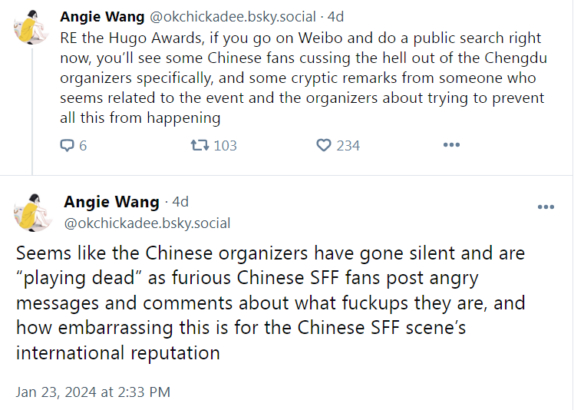
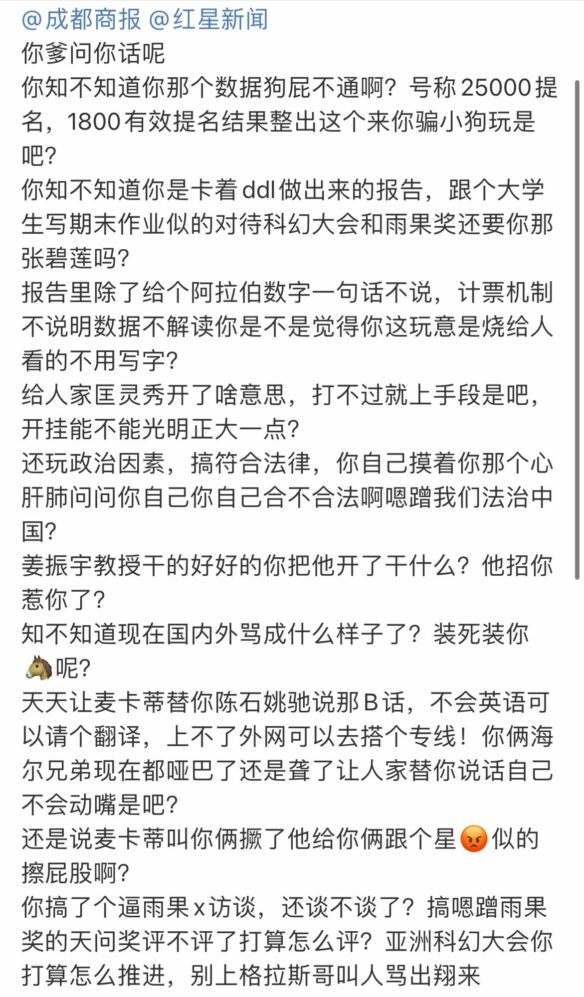
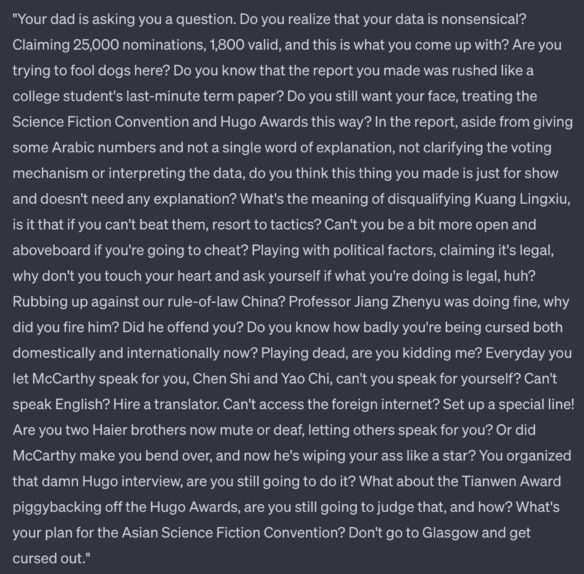
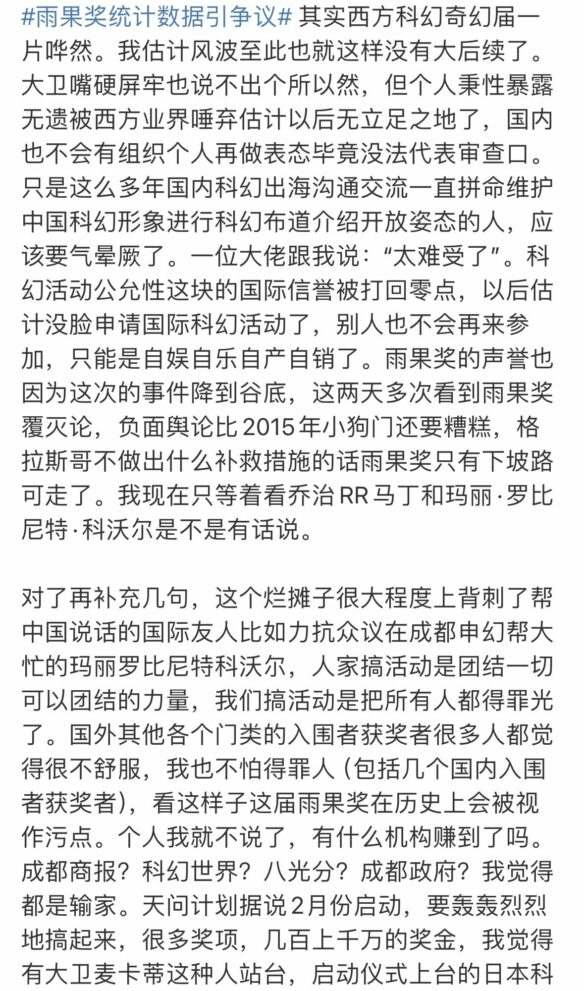
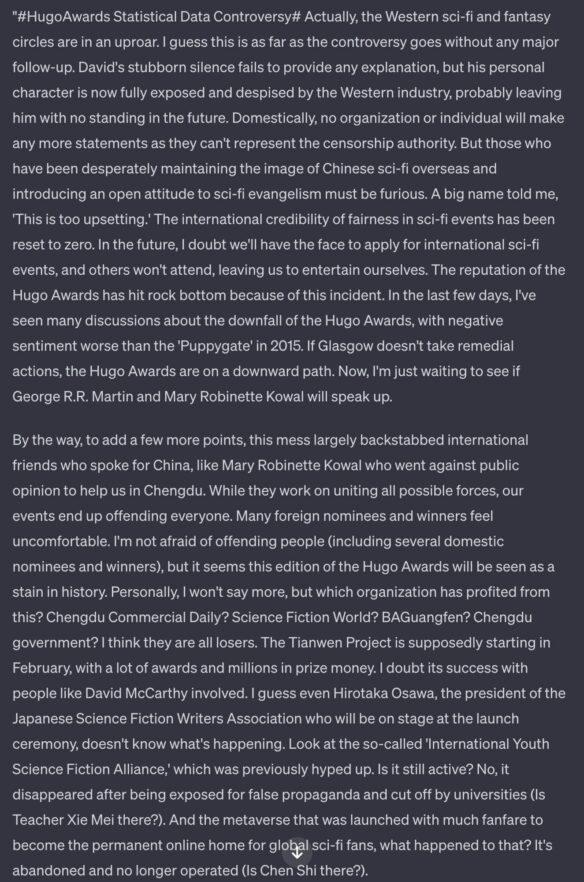
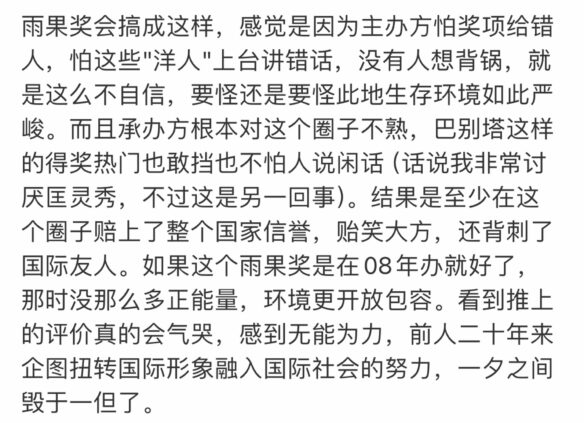
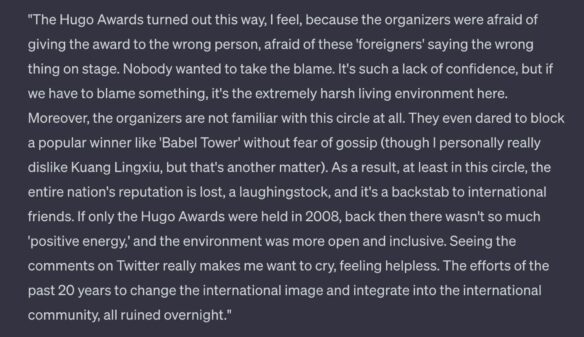


These Google Translated excerpts are particularly remarkable and damning considering who was saying them.
La Zi has placed themselves at great risk for expressing their displeasure at what may have been perceived as a corruption somewhere in the nominating process, and thereby affecting the Final Ballot lineup.
And if this is the tip of the iceberg of scorn fermenting in the PRC, I can only imagine how badly this fiasco is going down among the rest of the sff fans there. I have no doubt whatsoever that many of them fear that this will not only reflect very badly on Chinese fandom, but their chances of ever hosting a Worldcon again in the very near future have been greatly diminished as well.
I had gone to China naively hoping that something like this wouldn’t occur. A nation that has been insistent in stating that it is an innovative and prosperous society and an emerging world power, did not need to interfere, either directly or indirectly, in a prestigious literary event that they helped finance and widely promoted.
And while I am reluctant to comment on the Best Novel, Best Dramatic Presentation and Astounding Award for Best New Writer categories, I am willing to venture a few comments on the Best Fan Writer category.
As many of you know, I was also nominated in the same category at the 2022 Worldcon, Chicon 8. That convention’s Hugo was awarded to Cora Buhlert of Germany while I placed fifth on the ballot. My fellow nominee Paul Weimer, finished in third place.
I have said in my Chengdu acceptance speech that I considered Mr. Weimer and all of my fellow nominees as being my peers, not rivals. I also said that I would have been happy if anyone else in this category had won instead of me. Except this time it was me and I am eternally grateful to have won.

But, as you can see in the chart above, Mr. Weimer, who had been a nominee at the previous three Worldcons, is marked “ineligible” with no explanation attached. I have a theory as to why that may have happened:
After the selection of the Chengdu bid in December 2021, Mr. Weimer was one of the vocal dissenters of PRC holding a Worldcon, citing the government’s authoritarian practices inside the country and other concerns about their record on human rights domestically and in the region.
Using the nomination chart as circumstantial evidence, I am quite certain in theorizing that among the top four nominees on the Long Nomination List, it was Mr. Weimer who was the most vocal critic of the PRC among us. And that he was clearly targeted.
Please note that before Mr. Weimer was erased from the ballot, all of the fan writers were from the West, save one, RiverFlow, who is Chinese. After Mr. Weimer declared “ineligible”, the next nominee down the list, HeavenDuke (which is the pen name of Arthur Liu) was promoted to the Final Ballot.
I have read HeavenDuke’s work and I found it incredibly worthy of a Hugo Award. I DO NOT blame HeavenDuke for this unfortunate happenstance since he, I and all of the other finalists are probably feeling a great deal of unease at the prospect of anyone putting their finger on the scale to diminish Paul Weimer to the advantage of someone else in the category.
But here’s an interesting piece of speculation; what if HeavenDuke’s presence on the ballot inadvertently cost RiverFlow a Hugo Award?
As you can see from the distribution of votes, I received a majority of the votes in each of the six rounds, but each time the votes were distributed, RiverFlow gained votes. It’s interesting to note that it seems RiverFlow and HeavenDuke split a number of votes through each succeeding round. Had RiverFlow been the sole Chinese nominee, he might have been an overwhelming winner that evening and could have taken home two Hugos instead of the the sole award he shared with his co-editor, Ling Shizhen, for Best Fanzine.
Or, conversely, could Paul Weimer have won on his own?
We’ll never really know for sure.
Obviously, there are a lot of suggestions on how we can prevent this travesty from ever happening again. I have a few ideas of my own:
- The administration of the Hugo Awards must be completely severed from the control or influence of the individual Worldcon convention committees or any governmental, judicial, legislative or law enforcement bodies of the hosting country.
This means that the Constitution of the World Science Fiction Society must be amended to split off the awards from each annual convention in favor of a non-profit organization with a rotating series of administrative volunteers who will handle the nomination and voting results. An organizational model such as the National Book Awards, the Newberry Awards or the Pulitzer Prizes should be considered. Under this separation from the convention, the Hugo Awards will retain their trademark and, if necessary, distribute the awards independently of the Worldcon.
- There has been a considerable amount of consternation from some western fans that the Worldcon should never have been held in the People’s Republic of China in the first place, citing their various human rights violations and hostile geo-political intentions. Several weeks ago, the Editor Emeritus of Amazing Stories published an editorial outlining his concerns about upcoming bids from Uganda, Saudi Arabia and the prospect of countries like Russia, Belarus, Hungary or other totalitarian regimes, who could legally bid for a Worldcon: “The Fannish Inquisition Needs More Than Soft Cushions and Comfy Chairs”.
Mr. Davidson urged sf fans, who vote on Worldcon Site Selection every year, not only to be more aware about which countries were bidding, but demand that harder, sharper question be asked during the bidding process saying:
We, Fandom, have to develop some standards for the awarding of that opportunity. We’ve got to step up and recognize that there are more things in play than just our desire to hang out in a country we’ve not been to before.
In conclusion, Davidson wrote:
Countries wanting a Worldcon to help advance their own agendas on that stage gives Worldcon leverage. Leverage that it can use to support and advance its own cause. Let’s not blow it.
I have an even better idea; instead of admonishing fans to do better voting-wise, I have a few more radical solutions that fans, con runners and bidders, cannot ignore.
The next successive WSFS Business Meetings should incorporate the United Nations Universal Declaration of Human Rights into the Site Selection portion of WSFS Constitution.
In case you are unaware of this historic 1948 document, here’s a refresher.
In his forward to this version of the document, former UN Secretary Ban Ki-moon (who served from 2007-2016) wrote:
The commitment of the United Nations to human rights stems from the Organization’s founding Charter. The international community has a duty to uphold and defend these rights. Let us ensure that those people who most need their rights protected are made aware that this Declaration exists — and that it exists for them. Let us each do our part to make these universal rights a living reality for every man, woman and child, everywhere.
With the adoption of these principles codified in the WSFS Constitution, sf fandom will be sending an unambiguous message that we take being the guardian of human rights very seriously.
Also, the WSFS Constitution should be amended to require that any Worldcon bid sign a legally notarized statement, stating that their bid and subsequent Worldcon will abide, to the letter, every provision of the Universal Declaration of Human Rights. And if ANY bid refuses to sign and submit such a document, the bid will be disallowed. Any bid that wins and fails to live up to the standards of the Declaration, through their actions or inactions against outside influences, the bidders from that country will be permanently banned from bidding for a future Worldcon.
- In addition, another legally binding provision should be added; that ANY country that attempts to, or does interfere in the function of a Worldcon, the convention committee, staff or their attendees, that country will be permanently banned from hosting a Worldcon.
- Some sort of compensation should be offered to all of the people who were declared “ineligible” on the 2023 Hugo Awards Ballot. I have no idea what sort of offering that the Glasgow (or Seattle) Worldcons can bestow but I hope someone, somewhere, with a higher pay grade and bit more imagination than yours truly, will come up with a graceful and appropriate idea.
When I traveled to Chengdu, I didn’t go as an American or a westerner who loved sff. I went as a representative of the wider world of fandom.
There has been some loose talk about asking (or pressuring) the winners in the affected categories to consider “returning” their awards.
Return them? To whom? The Convention Committee? The Hugo Award Administrators? The nearest consulate of the People’s Republic of China?
I have a question for anyone who wants that to happen; have you seen this Hugo Award?
I will treasure its presence in our home for as long as I live.
After I first held this award in my hands for the first time on the stage of the Hugo Awards Ceremony, I remarked in my acceptance speech how lucky and grateful I was to be bestowed with such a beautiful and magnificent piece of sculpture that was appropriately symbolic of the science fiction and fantasy community and of the culture of the host country as well.
To me, it was very reminiscent of the 2007 Hugo Award design by Takashi Kinoshita, which incorporated Japan’s Mount Fuji, the rocket and the imposing figure of their national tokusatsu hero, Ultraman.
Here’s the point I want to make; I take being the recipient of this Hugo Award, even under these rather trying circumstances, very seriously. To me, it’s more an achievement in fandom or the symbolic of honoring my fan writing in a given year.
I am fully aware that people may regard this set of Hugo Awards as being either not very desirable or tainted because of what happened with the release of the Long List of nominations on January 20th.
You may do as you like, but I am defining this award for myself and my family and friends.
To me, it is the dream of a lifetime; a shining totem that I will eventually pass on to my daughter Laura and then on to her daughter, Navia.
It is my tiny little mark in the library of literary history.
That I did something. And I will be remembered, even in this small way.
That’s all I ever wanted from my participation in fandom.
And it’s enough.
Discover more from File 770
Subscribe to get the latest posts sent to your email.

” ANY country that attempts to, or does interfere in the function of a Worldcon, the convention committee, staff or their attendees, that country will be permanently banned from hosting a Worldcon.”
You’re going to have to narrow this down a bit, because I can think of a whole lot of ways in which I want nations to interfere in one or more of these, such as for example “fire codes”.
Gary, Cora:
I don’t think we can use any external list, because we’re not doing this as a matter of principle. This is to protect our particular community with its specific needs, and our particular forms of expression.
All these various external lists juggle lots of different factors, including oppression against all kinds of different groups. At present we need to prioritize freedom for queer people (in the most inclusive sense), which external lists may put lower on the priorities list than economic freedom or freedom for certain ethnic minorities.
I agree, Gary, that we can’t necessarily just take a bid committee’s word for it. For instance, imagine it’s 2026, we’re in a Trump Administration, and rules against Muslims entering the US have been re-tightened, worse than before. Remember what Amal el-Mohtar went through last time? Whether a US Worldcon bid should be accepted would require input from Muslim fans in the US & outside it, they would be the best judges of how free/unfree the US had become.
So I guess I’m saying the systems have to be set up with flexibility, not just rules. But we need to be clear that the goal is to protect the community and our work, not to adhere to some general Principle of Freedom.
@Lis Carey thanks, but I wasn’t asking to have the Hugos ‘sprained to me. I was asking when the “on the night of’ tradition started.
FWIW my current impression (this is not an assertion nor an accusation) is that the prospect of being permanently part of a shiny new Chinese venture (Tianwen) was dangled to certain people which induced their complicity in being cooperative about the things around weird numbers and unexplained disqualifications…and I’m wondering if it was actually much further back, during the bidding process, to keep us from asking the hard questions about member safety and potential censorship, etc that many of us were attempting to ask before the bid was ever seated.
I know that there have been serious efforts to woo Western fondness of Chinese SFF quite a while before the bid was even concrete, and that I’d refused to participate out of fear for my own safety and freedom to speak everywhere.
Someone on Stross’s blog found these:
http://www.china.org.cn/arts/2023-10/23/content_116768150.htm
https://www.newsdirectory3.com/tianwen-unveiling-chinas-diverse-science-fiction-to-the-world/
Note the following from the second link:
“The project was unveiled by Alai, Vice Chairman of the Chinese Writers Association, Hiroshi Osawa, Chairman of the Japan Science Fiction Writers Association, and Dave McCarty, head of the Hugo Award Selection Committee. Alai expressed his hope that “Qu Yuan’s romanticism and idealism will be better publicized in ‘Tianwen’”, while Osawa emphasized the impact of the project on shaping the future generation.
The “Tianwen” plan includes the establishment of the Tianwen Global Science Fiction Literature Prize, which will be awarded annually from 2024. This prize aims to encourage new and young writers, focusing on their innovative literary works and expression of new cultural fields. It will serve as an important supplement to the prestigious Hugo Awards and contribute to the diversity of the Hugo culture.”
My first reaction to this was pure paranoia: Is the plan to deliberately screw up the Hugos and bring in their own award? The English version of the press-release plus how the ballots were counted certainly lends itself to that possible interpretation. My second reaction was to wonder whether someone in China now imagines that they own the rights to the Hugo name, or that they’ve added something to the Hugo bylaws which requires the spawning of a second award? Or is this press-release either an awful translation (quite possible) or an attempt to muddy the waters? (Less likely.) Maybe someone who knows a lot more than I do can set me straight!
Also note who’s supposedly involved in all this:
““Consensus” reached a consensus on the development of the science fiction industry from eight directions. Those who pressed the release button together were: Robert Sawyer, guest of honor of the World Science Fiction Summit Chengdu 2023; Richard Taylor, founder of Weta Studio; “The Wandering Earth” “Guo Fan, director of the film series; He Xi, Chinese science fiction author and co-chairman of the World Science Fiction Summit Chengdu 2023; Wu Xian, producer of “The Wandering Earth”; Jin Shao, director of Research Center the Science Fiction Industry of Beijing Union University; Zhao Jilong, CEO of Trisolaris Universe; Tencent Tianmei Chen Peng, general manager of the studio; Yao Haijun, deputy editor-in-chief of “Science Fiction World” magazine; Liang Xiaolan, vice president of Chengdu Science Fiction Association … They come from every link in the science fiction industry chain – literature, publishing, film and television, games, IP development, commercial derivatives …”
Are Dave McCarthy and Robert Sawyer really as deeply involved as this press release implies? I hope not, and Dave’s already in enough trouble.
Regardless, if this press-release is even half-real the Hugo swamp is much deeper than we’ve previously imagined.
KTO: Like the song says “There were hints and allegations” of Hugo stat releases at some of these Worldcons. The 1989 Worldcon distributed a newsletter with the winners and the runner-up rankings, but not the voting stats. The 1990 Worldcon daily zine alludes to there possibly having been stats passed around (which happened over the years, but we’re talking about a few individual copies of a report). At the 1991 Worldcon a press release with the stats was distributed at the convention, including being given to Locus, File 770, and uploaded to Compuserve. I can’t tell whether there was a mass distribution of a paper copy at the con. In 1992 there was a paper press release with the stats distributed at the Worldcon. However, the daily newzine only carried the winners. So it seems like this was the point in time where a release of the full stats by the end of the Worldcon became a regular practice. Sometime later it expanded to being widely copied as an edition of the daily newzine. Maybe I will be able to track that down; I remember being there the first time it was done.
Folks, it may not matter. China will have their own initiatives, with corporate sponsors, and no doubt big money to attract any famous authors they like. The use of WSFS is done.
@Richard Man the issue here is not to bring Chengdu to account.
This is about WSFS and the reputation of the Hugos, and the need to get THE SMOFs to do the necessary repair, OR FOR US TO BOOT THE SMOFS LOUDLY.
OK, yes I understand your point now. Thanks for clarifying.
It is true that Babel’s numbers don’t change but yet they still appear to be running against the other nominees and even then it still wins a spot. Perhaps, it is as you say, that they had decided to disqualify it and so didn’t change the EPH points?
However, that wasn’t done to the other “ineligibles”. They all have changing EPH points. Meanwhile, there are other cases of nominees whose points inexplicably do not change but where the nominee wasn’t deemed ineligible. Editor Long form has a clear example along with other numerical insanities.
I can’t explain why these stats were released. They are doing my head in.
@KTO, I agree we need to do something going forward, to fix WSFS, worldcon, and Hugo as have been discussed.
The “doesn’t matter” which I wrote refers to the Chengdu worldcon part. Maybe Tainwen will issue a statement about “mistakes were made and responsible parties sent to rice paddies” or maybe they would just ignore any inquiries about their finance, voting records, anything. Tianwen doesn’t need us any more.
Two things:
First – The “conspiracy theory” explanations have begun to remind me of the plot of Miller’s Crossing (arrange to get kicked out of the org, join the rivals, use your position to undermine the rivals, deliver the victory to your old pals)
Second- Suggestions to use various assessments of world human rights compliance have been on the table for a while: my suggestion (and I’m massaging data and figuring out methods of presentation) is to use a number of such organization’s compiled data and presentations (graphs, maps, charts) to offer up a regular/semi-regular resource so that there is at least some data that everyone can review and then argue the merits of, at the very least having the same information to argue over.
This is not easy.
As mentioned in an earlier comment, this, that or the other organization’s potential bias can itself be questioned; rights and their abuses are more often than not NOT equally distributed and enforced throughout a country (the US right now is a patchwork of states that are/are not problematic for Fannish expression – this applies to other country’s sub-divisions as well) and – using the US as an exemplar again (which is itself damning), things can change over night as the results of elections, insurrections, civil wars and revolts.
Just one bit of nuance: suppose there’s revolution in China, the “people’s regime” is over thrown and a new government, expressing democratic values and the intent to extend freedoms, is installed.
Do we add “New China” to the list of acceptable locations right away, or do we wait to see how things develop by implementing some kind of “cooling off” waiting period before changing the assessment of that country?
Or – Ukraine. The government has imposed various restrictions on its citizens seeming out of necessity and the implementation of some aspects of martial law (conscription, for example). But Ukraine would, absent the war, probably “qualify” as a good place to go for Fans. After the war, do we down-check that country because in the recent past it imposed restrictions on its citizens?
The best we can hope for is to offer up the data gathered by various human rights organizations, appropriately not where and if potential biases exist with an organization and then display it in an accessible and coherent manner. It will still be up to individual Fans/voters how to utilize that data when making their choices.
The post at the link discusses this and includes a map of the world from Freedom House (mentioned in an earlier comment) in which “Human Rights” assessments of individual country’s are color-coded. The map was then modified to include notation for those countries that have previously hosted Worldcons.
Significantly, you will note that save for one country, all previous Worldcons have been held in countries that Freedom House suggests enjoy decent human rights.
I think you all should take a look at that map for a few seconds.
what-values-should-a-country-that-will-host-a-worldcon-have?
See also Dashiell Hammett’s THE GLASS KEY, Akira Kurosawa’s YOJIMBO, Sergio Leone’s A FIST FULL OF DOLLARS, and Walter Hill’s LAST MAN STANDING.
@stevedavidson
I am going to assume you mean to add the shade of green between the US and China into the group of countries we should not hold Worldcons in? I point out there’s a current bid in one of the countries that is that color (Uganda, which has its ahem own problems).
I had zero — absolutely zero, none whatsoever, nada, zilch, nil — involvement with the planning, development, or any other aspect of the Tianwen Program or the proposed Global Science Fiction Literature Award.
I hadn’t even heard of either of them until the specific programming event at Chengdu Worldcon referred to in the press release. Nor have I heard of either of them again since the convention until today; I was involved in no way before or after Chengdu Worldcon with them — not in any way at all — and have had absolutely no discussions or correspondence with anyone anywhere about them ever.
You can take this part of the press release literally: “Those who pressed the release button together were …,” followed by a long list of names. Seeing no documents whatsoever in advance, I was brought by my handler/interpreter to the appropriate hall, ushered on stage, and asked, along with the others mentioned in the release, to jointly “press the release button,” which was a bit of pure theatrics involving pushing a giant on-screen button.
Various Chengdu Worldcon guests, including myself, did this several times throughout the con. Sometimes there was one big on-screen button, and we all put our hands on it simultaneously; at other times, there was a row of physical buttons, and we each stood in front of one, and, when signaled to do so, pressed them in unison.
That’s it; that’s all; nothing more. I had not heard about, seen, commented on, reviewed, contributed to, or in any other way been involved with or approved the Tianwen Program or the Chengdu Consensus on the Science Fiction Industry, nor am I in any way, shape, or form an author of or signatory to them or involved in any of their initiatives, including the proposed Global Science Fiction Literature Award. Nor am I involved in any remotely similar programs, initiatives, plans, or awards under any other names.
Throughout most of the convention, including the pressing of the button referred to in the press release, my handler simply whisked me from place to place and told me that my ceremonial role was to do whatever it happened to be at the moment. My official Chengdu Worldcon programming schedule — the only one ever given to me — is up on my website; as you can see, this event isn’t even listed on it:
https://sfwriter.com/sawyer-chengdu-worldcon-schedule.png
Here’s a picture of us all actually pressing the button (I’m at the far right) — the complete and total extent of my involvement:
https://sfwriter.com/chengdu-worldcon-button-pressing.jpg
Robert J. Sawyer: I had zero — absolutely zero, none whatsoever, nada, zilch, nil — involvement with the planning, development, or any other aspect of the Tianwen Program or the proposed Global Science Fiction Literature Award.
Surely you don’t think any of what you’ve posted here mitigates your participation?
You knew when you chose to accept the GOH position that you would be used as a propaganda tool by an authoritarian government.
We all told you, when you chose to accept the GOH position, that you would be used as a propaganda tool by an authoritarian government.
You chose to cede control of your schedule and your activities — in a place where you did not understand the language — to someone that you had no way of trusting to translate honestly for you or to tell you the truth.
And now you’re claiming you bear no responsibility for your participation?
The phrase “complicit dupe” comes to mind.
Chris, thanks as always for the insightful comments and observations, and providing a useful forum for discussion.
I’m glad the fiasco wasn’t worse. This is not as bad as I expected.
I agree, we should include the UN statement. And yes, we should hold the US to the same standard. I don’t expect all of SFF fandom to agree, the political range of stories makes clear that will never happen, but if we want our treasured awards to avoid future compromise, we need to make something like this happen.
I’m curious what the Glasgow and Seattle organizers will do with this.
@JJ: you are a great deal more certain of your incorruptible virtue than I am of mine. I think you are being shockingly and unrealistically hard on people who made choices that turn out in hindsight to have been manipulable. You weren’t tempted by China, which is fine. But China itself, its vast beauty and weirdness and promise and scope, is a thing that many people were entranced by, and rightly so. And, too, there have been numerous jaunts by other sf writers sponsored by the government that did not go badly, did not result in this kind of manipulation. So I think that for someone who wanted to go to China, there was good reason to believe that it was sensible and safe.
Gary Farber
Last I checked, there were more people than just you involved.
Don’t want this in your name?
Fine, don’t join any convention that supports this.
It’s flawed, it’s not perfect, but it sure beats waving your arms around in moral indignation without offering your own solution.
It appears you have made suggestions. I apologize for saying that.
I stand by the rest of the post.
So what was gained by blatantly freezing Babel, and only Babel, in the middle of calculations, instead of removing it before applying EPH (since they are implying that they would have already considered it ineligible for who knows what reason) or after applying EPH (in accordance with the Constitution’s stipulation about how to remove finalists)? Having set that precedent, why were the other ineligibles not similarly frozen after one round? The redistributions would have led to different outcomes? A change in the list of finalists or the longlist, or revealing some additional information we don’t currently have?
Fans in Asia (China, Japan, etc.) would see a bunch of people getting roped into some photo op at a conference and not take it too seriously. We probably shouldn’t take it too seriously either.
Brian Z
Lumping fans from China. Japan and etc into “Asian” fans show a lack of sensitivity and nuance that’s cringe worthy.
That whole final paragraph tells me you shouldn’t be taken seriously at all.
You have hit a key point in all of this. There are many elements but they don’t add up to a coherent story where we can say X did Y because they wanted Z.
Why mess with Babel’s stats if you are going to disqualify it anyway? It makes no sense but then there’s no story where messing with Babel’s stats makes any sense. Is it the other way around? Did they disqualify Babel because its stats make no sense? OK, then why not disqualify everybody else with nonsensical stats?
Photographing a bunch of VIPs on stage pressing a button to inaugurate a literary effort as if it were some giant new hydroelectric plant is intended to symbolically convey an auspicious beginning of great significance, the honoring of cherished guests and dignitaries, and a manifestation of the cultural values of collective effort and collaboration. If there’s any corner of Asia where they’d look at that and take it at face value, I’m coming up short. The Consensus being promoted is that “the science fiction industry is vast and limitless.” What, you want to disagree?
@Gary Farber: Isn’t Red Harvest the one with that plotline, in the ghastly town of Poisonville? Or least one of the ones – I’ve reread it within the decade, but not The Glass Key, so I don’t know if he used the conceit more than once. (Also, someone needs to do it as a horror story. Any sort of supernatural evil that can have factions would do.)
@Camestros Felapton and @Brian Z: At this point I am honestly wondering why McCarty, or someone else on his behalf, didn’t just take what they’d decided the final numbers would be and run EPH numbers from that, filling in the starting info about ballot composition from actual ballots where feasibly and making up others as need be. I have a feeling I’m missing something, but it seems like although there’d be the possibilities of some copies of short or long list info floating around, surely not when it comes to EPH data. shrug The whole thing is just so weird.
I’m perplexed by the multiple messes.
The speculation has been that one person, or more than one acting in concert did this. Perhaps this is 3 people doing 3 different messes?
Someone I was talking to this evening raised the idea this mess is a deliberate call for attention. Hugo nerds were inevitably going to study the results. These messes could be a statement there were problems by people who can’t publicly talk about the problems.
Given how the elements work counter to each other, the “Too Many Cooks” idea that different people with different intentions put their hands in to this mess is one of the more plausible theories.
The most sensible way to rig the stats is to rig the ballot. The EPH software should be quick to run with clean data, so it is also possible to not just rig the ballot if you control the data but to do so iteratively i.e. put fake data in, see the result, tweak the fake data, put it back in etc. You’d need a bit of time, some familiarity with past results and, of course, some strong motive, poor supervision and a lack of moral integrity…but that’s how to do it.
Do the published results look like that? No! They are full of absurdities and errors. So the one thing we can rule out is a competent attempt to change the results of the ballot by somebody with full control of the ballot.
There are clearly layers of issues here and Brian’s question highlights something. Multiple different kinds of something must be going on but we don’t have a clear idea of the ORDER of those somethings.
Babel is of particular interesting because most of the issues apply here:
1. Babel’s raw vote number look inflated as do the other top 7 nominees. This is the Cliff issue that Heather Rose Jones analysed.
2. The EPH total points in the first listed round EXCEED the total number of voters given at the top of the page. Marshall has documented similar issues in other categories.
3. The ratio of raw votes to EPH points in that first round for Babel and the other top 7 nominees is very high (4+). This shows a kind of average number for how many other nominees still in play the nominee shares a ballot with. By this point this ratio should be somewhere between 1ish to 2ish. The top 7 are very coordinated ballots, like hundreds of voters picked between the same 7 nominees very closely.
4. Babel’s EPH points never change. This is unique to Babel in this category but occurs for some nominees in other categories. This is impossible as we know some people voted for works shown in the longlist that were then eliminated. The clearest example is The Mountain in the Sea. I’ve gathered multiple examples of people who had both Mountain and Babel on their ballots which demonstrates the EPH points for Babel cannot be correct.
5. Babel is disqualified with no explanation.
As eligibility is supposed to be decided last, we all assume that was the last thing to happen but that assumption rests on the process following procedure. However, we know the process is flawed from point 4. So Brian’s speculation that Babel was already disqualified when they started counting isn’t totally nuts. We can’t trust the assumed order of events BUT if we don’t then we have to just give up at this point.
If we do trust the order of events then we could explain 1 and 3 as evidence of ballot stuffing. This would be external to the Hugo committee and not their fault. They aren’t technically empowered to say “hey, these ballots look dodgy” and the likely bad PR that would follow would be a disincentive to doing so. There is also nothing anybody could do in such circumstances without clear evidence beyond the improbable numbers.
Point 2 must be an issue from within the Hugo committee. Slates or ballot stuffing or just people voting in weird ways for legitimate reasons shouldn’t make the total not add up. That must be an internal error.
Point 4. This is interesting. EPH could have been run properly on a set of ballots where nobody who nominated Mountain also nominated Babel. That is what those numbers imply but that would mean that not only did we have ballot stuffing but also ballot deletion or just fabricated data altogether or in part. Alternatively, it could be just an error in making the table for the report. Maybe they just copied the number from the last round to the earlier round in the table for the report.
Alternatively, there are errors in the names listed in the longlist. Maybe Mountain in the Sea was eliminated much earlier and they just put the wrong name on the published table. If it is some other work then it is less mysterious that no points transferred to Babel.
Either way, this is an issue that MUST be something that the Hugo Committee should have been aware of regardless of its cause.
Point 5. Then, after all that, Babel is disqualified. I think it makes most sense that this happened last and at least somewhat independently of everything else.
I stand by the theory that the Cliff Building occurred after the finalist was generated, and said building was done by someone who didn’t understand the EPH impact, and thus either they did a terrible job trying to fix it OR someone else tried to tweak the EPH numbers to match the cliff and also did a terrible job of it.
(Adding to that, I have the theory that most folks on the committee really don’t understand how EPH works– or what “typical” nominating looks like– and thus the Cliff and the Fix are such a mess. Or rather, either they think we don’t know and thus we wouldn’t think it looks wrong, OR they don’t know and thus they release this data thinking it looks fine. Or both!)
@Robert J. Sawyer
Unless you were somehow able to shapechange into Concom and Hugo Team member Chen Shi, I think you have linked to the wrong picture.
As it happens, I came across a video of the “Science Fiction Industry Consensus” ceremony earlier today, whilst looking for something else – here it is. WARNING, VIEWER DISCRETION IS ADVISED: The back of Dave McCarty’s head is very prominent in the foreground throughout.
I had given up trying to squint to see the published data as being the result of an actual attempt to apply the EPH rules to actual ballots. But in terms of a scenario that might explain Babel’s numbers as a good faith calculation… Given the visible disarray of the published results, perhaps there was insufficient cleaning of data – possibly because ballots were returned in a bewildering variety of different fonts and encodings – and no automation? Perhaps the admins threw up their hands and had students put the ballots into spreadsheets and calculate manually. Then if a call came in – “Cancel Babel!” – calculators might interpet that as freezing that round’s score. I guess that could also explain why they just didn’t rerun EPH – it would take too long.
Or else, we’re back to they don’t have enough respect for us to fake the numbers convincingly.
The Western bloc looks like a secret slate. Don’t know if that’s sufficient to explain the cliff.
@Camestros Felapton: I feel like I’m getting an improved sense of what I don’t know. Which probably sounds sarcastic, but isn’t.
@I agree that it all really takes multiple people messing with things. And the speculation that multiple messers and others had poor understanding of the systems certainly fits the evidence.
I think Brian is right that there was almost certainly insufficient data cleaning. That’s a notorious problem even when the nominations are all in one language (and script). A really good data cleaning job would have needed the kind of bilingual skills most easily found in the Chinese diaspora–and those fans stayed away from Chengdu.
I think there’s also a large element of weaponized incompetence. Dave McCarty always thought EPH was “too hard”, and he’s clearly an impatient person. He also isn’t fluent in Chinese. Was he the person helping Chengdu set up and run their system? Who was? Who fielded their questions and talked them through problems? It wouldn’t surprise me one bit if the people on the ground in Chengdu never used the EPH software, or not consistently, or not as intended.
There were probably several waves of incompetent fixes, possibly with competing agendas, even before the round where the disqualifications took place.
None of this was really directly caused by the political situation in China. Except, because of that situation:
a) most of the international fans best-suited to help (= Chinese diaspora) were unwilling to participate
b) communication between fans in China and outside had to go through or around the Great Wall, so was poor & unreliable
c) only a few international fans ended up having most of the contact with Chengdu Worldcon, and none of them AFAIK have strong knowledge of Chinese language or culture.
I agree that we’ll probably never know exactly where the nomination numbers came from. But the whole fractal flustercluck is a strong argument for at least a Hugo Administration Committee independent of Worldcons, to do the jobs that don’t change from year to year: cleaning the data, running EPH, determining eligibility, contacting nominees. The boring stuff with a learning curve.
Yes it does. Less so in some other categories but in Novel and Best Series where the “cliff top” is biggest, it advantages English-language works that were plausible Hugo contenders.
Having said that, if it was a slate or ballot-stuffing exercise it was done very quietly (before and after) in all ways except the actual numbers. I can imagine many people (including Chengdu Worldcon) would have liked a set of Hugo finalists that was a nice mix of “usual suspect” nominees and Chinese nominees. Some categories do have a nice mix down ballot. So, I don’t really get a motive if it was ballot-stuffing or a likely suspect. Very, very odd if it was something done inside the Hugo team, especially as it ensured Babel should have been a finalist! Like every theory I’ve seen it covers a lot of the facts but then crucially is contradicted by others.
My cat thinks it was a plot by bloggers so we have something to talk about and that theory makes as much sense as any.
I agree with Doctor Science. And not just because of the name, but that’s a good name.
Having experienced people do “The boring stuff with a learning curve” is always a good idea. Too many people don’t like learning curves, and running a con is, from everything I’ve heard, very, very full of learning curves.
Okay, someone has to ask the question. Were Space Lasers involved in messing with the EPH?
The magic of the Hugos, to the extent it still exists, lies in being a fan-run award run by a fan-run convention. It won’t be helped by a ledger of blacklisted countries, and it won’t be helped by a Bureau of Hugo Affairs. But we do need to know exactly what happened so the mistakes can be avoided.
(Maybe I shouldn’t climb on this soapbox right now, but it is true that EPH is too complicated.)
If a Western secret slate was organized, they wouldn’t have known in advance that they’d blow the Chinese nominees out of the water in big categories. It would have been calibrated with the intent of creating a nice mix… a mix that happened to include certain favored items. They couldn’t have known that Chinese fandom would collectively demonstrate their dissatisfaction with Chengdu by staying away from the Hugo nominations.
I can’t rule it out or it might be clone doppelganger time travelling robots
Dave McCarty predicts the future. (Warning: Facebook link, but it doesn’t require you to log in to view)
This is wild speculation, but unless someone comes clean, I suppose it all is.
Say I have the English language ballots tallied, with clear usualsuspect front runners. And maybe a chunk of Chinese language ballots come in, great, and then…something happens to another set of ballots. Pick your catastrophe—taken away by men in suits, ballots destroyed before tabulating, dog ate it, Excel spreadsheet working more or less as designed… Suddenly you have a big chunk of data missing outright. But hey, people all basically vote alike, right? So you hastily copy down the front runners from the already-compiled, non-exploded data and slap that into your spreadsheet, multiply by the number of ballots you got, maybe do a little artistic alteration in an attempt to cover your tracks…
(Alternatively, there is absolutely no track covering, you just copy the English data right over the top in the spreadsheet and hope no one notices.)
Could something like that explain the weird raw vote ratio and drop off? ISTR there were two different Chinese languages with associated ballots. If I’m not totally out to lunch, could one have been wiped out and the ballot numbers hastily recreated from either memory or assembled from the other two ballot chunks?
(Apologies if you’ve all thrashed this one out before—too many comment threads!)
Pingback: The 2023 Hugo Awards: A Report on Censorship and Exclusion - File 770